Tractor service provision is a common agribusiness adopted by a number of emergent farmers in Zambia. In order to support such a venture, the Zambian-German Agricultural Knowledge and Training Centre (AKTC) in collaboration with one of its private sector partners, BAYER AG, embarked on a training programme known as Professional Crop Protection Application (PCPA). The PCPA programme seeks to equip farmers (tractor service providers) with knowledge and skills related to chemical handling and application, boom sprayer calibration, GPS use in Agriculture and many more others. The first PCPA training was conducted in November 2020 with the trainees coming from Mpongwe district in the Copperbelt province, Chongwe in Lusaka province as well as Serenje and Mkushi in Central province.
On 19th to 23rd April 2021, AKTC with the help of the Conservation Farming Unit (CFU) organised a second group of 11 TSPs to be trained in a set of PCPA courses offered at the training centre. Among this group, 10 were male and 1 female, all coming from Mumbwa district in central province of Zambia. The 5 days training took place at AKTC – Golden Valley Agricultural Research Trust (GART) – Chaloshi Farm situated 65km north of Lusaka along the great north road.
On the first day of the training, farmers were trained in Chemical Handling and Application Procedures. This training was delivered by Mr. Geoffrey Matutu, Bayer’s regional sales manager. In his presentation Mr. Matutu talked about BAYER’s different products particularly those used in fighting weeds as well as pests and diseases in soya bean and maize crops. He further led the farmers into a step-by-step chemical safe handling procedure, application rates and safe storage and disposal of empty bottles
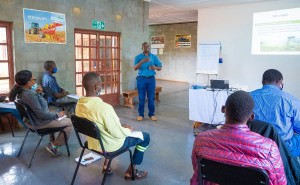
As a way of familiarizing the farmers with the AKTC activities, the first day of the training was concluded with a tour of the AKTC fields and renewable energy sites led by Mr. Leslie De Jager, AKTC’s crop production expert. Among the fields visited was the Climate Adapted Farming Methods (CAFM) project field that is currently undergoing a research study managed by a PhD candidate from the University of Hohenheim in Germany. Having explained the benefits of the CAFM project, Mr. De Jager highlighted to the farmers, the differences in soil structures among the plots with different tillage methods (i.e. disced, ripped and direct seeding). Farmers where able to see that indeed plots under direct seeding had better soil structures attributed by less disturbances as compared to the other plots.
Mr. De Jager also showed the farmers the cover crop field plots which are part of the CAFM research and explained how he is using these fields for his crop rotation cycle. He explained to the farmers the importance of cover crops in crop rotation, highlighting the benefits which ranged from improved organic matter to nitrogen fixation and many more others.
Tractor Operation and Maintenance was the focus of the second day of the PCPA trainings. The training was conducted by Mr. Martin Sikanyika, AKTC’s Agricultural Machinery expert. This training was vital to the farmers because not only did it expose them to the do’s and don’ts involved in tractor operation but also imparted them with knowledge in general tractor maintenance recommendations for weekly, monthly and yearly check-ups. As TSP’s the training on tractor operation and maintenance was very much important because if put into practice, it can help them limit any costs that arise from frequent tear and wear of the machinery. This can then lead to prolongation of the machinery lifespan while maximising on profit for their services. The other part of the tractor operation and maintenance training involved a practical tour of the tractor implements used in AKTC field demonstrations such as the ripper, cultivator, planter boom sprayer, fertiliser spreader and many more.
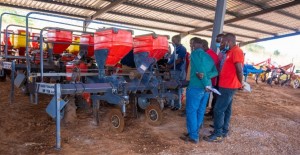
The third day of the training was rather a bit of a shift from the PCPA related trainings to Irrigation and Water Management. This was deliberately designed to complement the PCPA trainings with view in mind that irrigation and water Management was one of the trainings recommendations arising from the farmers themselves. Mr. Nambwale Kalunga, a technical advisor for NETAFIM South Africa (an irrigation specialised company) conducted the training. In his presentation, focused on drip irrigation system with specific topics on the types, installation or setting up and maintenance of the system. He further advised the farmers to adopt the use of the drip irrigation system stating that its far more economically viable and environmentally friendly as compared to other irrigation systems. A tour of the AKTC vegetable demonstration garden marked the end of the training. Farmers were exposed to a step-by-step practical maintenance of the drip irrigation system kit s they toured the vegetable garden.
The fourth day of the training involved a more PCPA based topic as it focused on Boom Sprayer Calibration. Mr. Leslie De Jager facilitated the training. As usual, he began the training with the theory on the factors considered before and during the calibration process, through which he emphasised that both pressure of the pump and speed of the engine has to be constant once set to avoid variations in the application rate. He also mentioned the importance of knowing quantity of the boom (in litres) with the thought in mind that some farmers have unmarked booms which can result into inaccuracies in terms of calibrations. Farmers where therefore taught on how to fill their booms (tanks) in case of not knowing their right quantity. 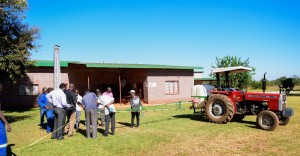
Chemical handling was another important subtopic that was tackled during the presentation. The facilitator discussed with the farmers the best ways of storing the chemicals, the meaning of container labels and colours in terms of toxicity stating that the red label represented high
toxicity while the green label is usually less toxic.
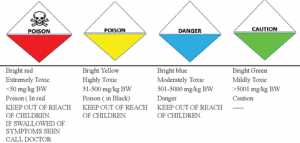
Mr. De Jager further emphasised that it is vital to make sure that the boom together with the nozzles are properly flushed with water after spraying as residue chemicals damage the boom through corrosion and the nozzles get blocked. He also stated the different types of nozzles, their spray patterns and which chemicals suitable for each nozzle type.
Later in the day, farmers were exposed to the practical part of the boom sprayer calibration where factors relating to the speed of the tractor and time taken where very much at play. In order to successfully carry out the practical boom sprayer calibration, a tractor mounted with a 600L boom sprayer was brought for the farmers to calibrate. Other required items like the measuring tape and jars were also provided. Farmers were then asked to measure the width of the boom and calculate the average flow of the boom after the speed and pressure of the pump were set. A task was later given for the farmers to calculate the area (in hectarage) the 600L boom can cover. After a few attempts, all farmers were successful and the training was concluded.
To close the PCPA modular training, Global Positioning System (GPS) use in Agriculture was offered as a last training. The GPS use in agriculture is one of the vital trainings in PCPA tractor service provision. Mr. Lushomo Muchindu and Mr. Genius Chabinga both from AKTC facilitated the training. As TSP’s, GPS use in agriculture training enabled the farmers to understand the quick and easiest ways of measuring the distance, area and picking of points of interest using the ‘field area measure’ application installed on their phones. The training was well appreciated by the farmers as to some of them, this was the first time of being exposed to an application with such functions. GPS use in agriculture marked the end of the PCPA modular training designed for Mumbwa TSP’s.
Conclusively, the AKTC/BAYER AG PCPA modular training was a success, and we believe that farmers acquired the knowledge and related skills in all the five topics that were offered. As a training centre, AKTC hopes to follow up on the progress of these practices by the farmers, even as we plan to host them again for the second set of the PCPA modular trainings. The next trainings will cover in depth the principles of PCPA and Farming as a Business. We hope that with this knowledge in practice, farmers will improve on their yields while applying environmentally friendly practices.
AKTC, April 2021
Contact:
Grenda Mweemba
AKTC Project Assistant
Grenda.mweemba@afci.de
www.aktczambia.com
.
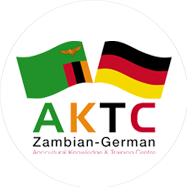
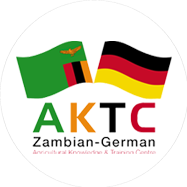

Leave A Comment